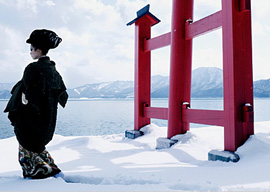
March 13, 2012

When Japan became the world’s No. 2 economy in 1960, seizing the crown from Germany to hold for 40 years, Japanese 24 years old and younger outnumbered the population 65 or older eight to one.
Japan’s fertility rate, the number of births per woman, has been below zero population growth for 40 years and has plunged to where Japanese woman are having only two-thirds of the children needed to replace the present population.
Not only has the birth rate per woman fallen, the percentage of Japanese women aged 15-49—56 percent in the 1960s—is expected to plunge to 31 by midcentury.
Every new Japanese generation is one-third to one-half smaller than the one that came before. Japan’s high school graduation class has fallen by more than one-third in just 30 years.
Nippon seems to be collectively committing national hara-kiri.
How did this come about? The means are not in dispute.
When millions of Japanese soldiers returned from their dead empire to start families, there was a population explosion. Under the U.S. occupation, Tokyo swiftly legalized abortion, and the nation embraced birth control. Japan did so before Europe, but Europe followed. Now all face demographic death, with Japan leading the way.
This has already begun to affect her national economy.
Japan’s growth rate in the 1960s was 10 percent a year. In the 1970s, it was 5 percent a year. In the 1980s, it was 4 percent—still a healthy growth rate for a mature economy.
But in the 1990s, the “lost decade,” Japan’s growth fell to 1.8 percent a year, and that anemic rate has continued into this century.
Japan’s expenditures during the lost decade to reignite the fire sent the national debt soaring above 200 percent of gross domestic product, eclipsing the debt-to-GDP ratios of Greece and Italy today.
In 2011, for the first time in 30 years, Japan ran a trade deficit. January’s figure, $19 billion for the month, was a record.
The abandonment of nuclear power has forced Japan to substitute imported coal and liquified natural gas to produce her energy.
During the decade of “Japan, Inc.,” in 1988, Nippon boasted of being home to eight of the world’s top 20 corporations in terms of capital investment. Now she is home to none, and only six of the top 100.
Yet when Prime Minister Noda said what was happening in Japan was “unprecedented in the history of mankind,” he was mistaken.
This also happened to the greatest empire of them all long ago.